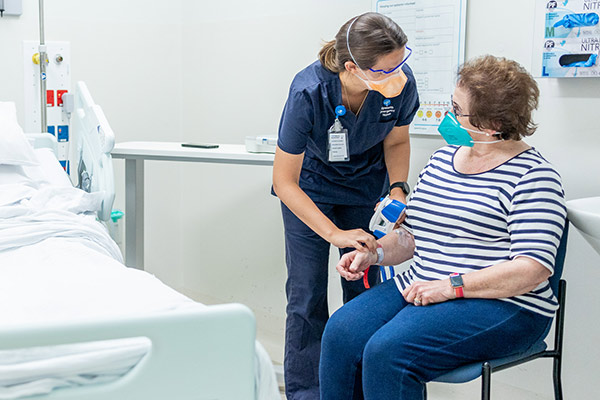عرض هذه الصفحة باللغة العربية
Pain management - Arabic
查看此页面的简体中文版本
Pain management - Mandarin
Xem trang này bằng tiếng Việt
Pain management - Vietnamese
Pain management for pancreatic cancer
Pain management
Pain associated with pancreatic cancer is common. Pain can result from the disease itself, or by treatments used to manage the disease. This makes pain management an essential aspect of care . Without pain management, your quality of life can worsen.
Advanced pain management
Pain that becomes severe or persistent may require advanced pain management strategies. These approaches target the source of pain directly, and include:
- Chemotherapy: By targeting and reducing the size of the tumour, chemotherapy can alleviate pressure and discomfort in the affected area.
- Radiation therapy: Radiation therapy uses high-energy waves to shrink tumours. This treatment may reduce pain caused by tumour growth pressing on nerves or other organs.
- Nerve blocks: Nerve blocks involve injecting anaesthetic, steroids or ethanol directly into or around nerves. The aim is to block pain signals from reaching the brain. There are several types of nerve blocks used in pancreatic cancer pain management:
- Endoscopic ultrasound (EUS) with ethanol ablation: This procedure involves using an endoscope equipped with ultrasound to guide the injection of ethanol near the nerves affected by the tumour. This disrupts pain signals to provide relief.
- Celiac plexus block: This technique targets the group of nerves that transmit pain signals from the abdomen to reduce abdominal pain associated with pancreatic cancer.
- Splenectomy: In some cases, surgery to remove the spleen (splenectomy) can be part of advanced pain management. This may be considered if cancer is affecting the spleen,or as part of a larger surgical strategy to manage the disease and alleviate pain.
Pain medications
Various medications can help treat your pain and make it manageable. Commonly prescribed pain medications include:
- Non-opioids – these are medications available without a prescription (over the counter) such as paracetamol (e.g. Panadol) and non-steroidal anti-inflammatory drugs (NSAIDs) like ibuprofen (e.g. Nurofen).
- Opioids – these are stronger medications that need a prescription, for example morphine and oxycodone.
Complementary therapies
Other non-drug approaches to pain management can benefit patients, especially when combined with pain medications or other treatments. These can include:
- acupuncture
- massage
- hypnosis
- physiotherapy and occupational therapy
- relaxation
- meditation.
Always consult your doctor before taking any medications or supplements they have not prescribed. You should also consult with them before starting a new exercise, massage or physical therapy program.

